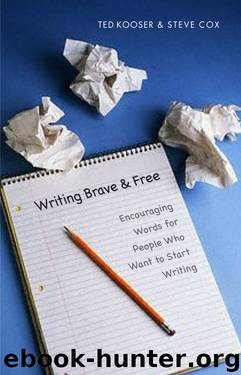Writing brave and free: encouraging words for people who want to start writing by Ted Kooser & Steve Cox

Author:Ted Kooser & Steve Cox [Cox, Ted Kooser & Steve]
Language: eng
Format: epub
Tags: Language Arts & Disciplines, Authorship, Composition & Creative Writing, Publishing, General
ISBN: 9780803278325
Publisher: Lincoln : University of Nebraska Press, c2006.
Published: 2006-01-01T05:00:00+00:00
1
2
3
SECTION SEVEN
4
5
Revision and Getting Help
6
7
8
9
10
11
[First Page]
12
13
[113], (1)
14
15
Lines: 0 to 37
16
17
———
18
* 412.43802pt PgVar
———
19
Normal Page
20
* PgEnds: PageBreak
21
22
23
[113], (1)
24
25
26
27
28
29
30
31
32
33
34
35
36
37
Kim — University of Nebraska Press / Page 113 / / Writing Brave and Free / Ted Kooser and Steve Cox 1
2
3
4
5
6
7
8
9
10
11
12
13
[114], (2)
14
15
Lines: 37 to 47
16
17
———
18
* 468.0pt PgVar
———
19
Normal Page
20
* PgEnds: PageBreak
21
22
23
[114], (2)
24
25
26
27
28
29
30
31
32
33
34
35
36
37
Kim — University of Nebraska Press / Page 114 / / Writing Brave and Free / Ted Kooser and Steve Cox 1
2
32
3
Revise and Wait
4
5
6
7
8
9
Writing is like shoveling snow—all the details you want to write about 10
accumulate so rapidly that you can’t get them all down. You’re not sure 11
that they will come to you tomorrow, and you’re not yet confident that 12
you will have plenty of other things to write about if your memory 13
[115], (3)
fails.
14
Revising, on the other hand, is like carding wool or like combing 15
out long strands of hair—raking out the tangles, the cockleburs and Lines: 47 to 74
16
dirt, and leaving the long strands clean and smooth and straight so 17
———
that a comb can pass through the long, smooth hair unencumbered.
18
0.0pt PgVar
Before you send a poem, story, essay, or chapter out in public, you
———
19
will want to make sure its shirt is tucked in.
Normal Page
20
It’s a rare first draft that can be published or even read in public.
PgEnds: T
21
EX
Almost every piece of writing needs some rewriting, rethinking, and 22
polishing before it is ready to take center stage.
23
The first step in spotting the flaws in what you have written is a
[115], (3)
24
simple one. Set it aside and let it cool off for a while, the longer the 25
better. Take a look at it after twenty-four hours if you must, tinker with 26
it a little, then set it aside again for as long as you can stand to. As if 27
you had put it in a petri dish, the longer you leave a piece of writing 28
by itself the more spores of trouble will surface. If you can bear to do 29
it, leave it alone till it begins to look as if somebody else might have 30
written it. (Stephen King sets the first draft of his books aside for six 31
weeks before writing the second draft.) Then you can see it for what it 32
is, a creation independent of you. Writing has to be equipped to thrive 33
on its own in a largely indifferent world. You can’t be there with it, like 34
its parent, offering explanations, saying to an unappreciative reader, 35
“Yes, but here’s what I meant . . .”
36
Just what should you expect to see when you look at your writ-37
ing after it has rested for a time? All sorts of things: peculiar syntax, Kim — University of Nebraska Press / Page 115 / / Writing Brave and Free / Ted Kooser and Steve Cox 116
Revision and Getting Help
1
tortured grammar, illogical thinking, misspellings, wordiness, silliness, 2
preciousness. You may discover that the sweet sounds and rhythms you 3
heard in your head when you wrote it now sound lumpy and awkward.
4
(If you want to, you can ask for a little help here. Have a friend
Download
This site does not store any files on its server. We only index and link to content provided by other sites. Please contact the content providers to delete copyright contents if any and email us, we'll remove relevant links or contents immediately.
| Authorship | Bibliographies & Indexes |
| Book Industry |
Asking the Right Questions: A Guide to Critical Thinking by M. Neil Browne & Stuart M. Keeley(5759)
Autoboyography by Christina Lauren(5228)
Eat That Frog! by Brian Tracy(4526)
Dialogue by Robert McKee(4389)
Sticky Fingers by Joe Hagan(4188)
Journeys Out of the Body by Robert Monroe(3615)
Annapurna by Maurice Herzog(3464)
Full Circle by Michael Palin(3443)
Schaum's Quick Guide to Writing Great Short Stories by Margaret Lucke(3374)
Elements of Style 2017 by Richard De A'Morelli(3341)
The Art of Dramatic Writing: Its Basis in the Creative Interpretation of Human Motives by Egri Lajos(3058)
Atlas Obscura by Joshua Foer(2953)
Why I Write by George Orwell(2945)
The Fight by Norman Mailer(2930)
The Diviners by Libba Bray(2927)
In Patagonia by Bruce Chatwin(2920)
The Mental Game of Writing: How to Overcome Obstacles, Stay Creative and Productive, and Free Your Mind for Success by James Scott Bell(2897)
Venice by Jan Morris(2568)
The Elements of Style by William Strunk and E. B. White(2470)
